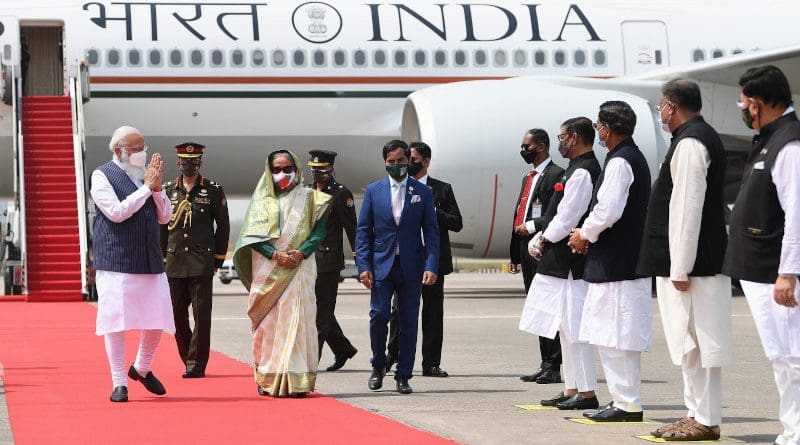Awami League Government’s Importance For India’s Security – OpEd
The message has been conveyed to Washington that Bangladesh’s friendly neighboring democratic country, India, is not happy with the current role of America in the upcoming twelfth parliamentary elections of democratic Bangladesh. Because New Delhi thinks that if Sheikh Hasina’s government in Bangladesh is weak, it will not be good for India and America. So why is India thinking this way? It is because due to geopolitical reasons, India is perceiving Bangladesh through the lens of security. And right now, for India there is no alternative to Prime Minister Sheikh Hasina for its own security.
The Awami League government had always been there for India when it needed it. There has always been reciprocity in the bilateral security relationship. Bangladesh has demonstrated its dedication to India’s security concerns. In particular, the tendency began with the election of Bangladesh’s Sheikh Hasina as prime minister. In addition, the Prime Minister Sheikh Hasina deserves praise for addressing India’s security concerns in order to establish a reciprocal security cooperation.
India’s northeast is one of the nations’ most security-vulnerable regions. Security cooperation has been a key component of bilateral relations between Bangladesh and India. In order to maintain security in its geographically challenged northeast states, India views Bangladesh as its closest friend. Due in large part to the tremendous assistance given by Bangladesh, the security challenges in the northeast region, like as terrorism, insurgency, and separatist activities, have been contained and managed. Bangladesh has made important actions to deal with the main rebel groups in the northeast and has kept tight ties with India in terms of intelligence-sharing and security issues. In order to address each other’s security concerns and build trust, Bangladesh and India likewise engaged into an extradition treaty in January 2013. With the deal, India obtained a means of suppressing the insurgency in the nation’s northeast. Additionally, the 2015 land border accord with Bangladesh prevented extremists from northeastern regions from finding refuge there. They were unable to continue their operations for insurgencies and separatist groups in the North East as a result. Present Indian External Affairs Minister S. Jaishankar expressed his gratitude to Bangladesh by stating that the strategic land boundary agreement between India and Bangladesh has resulted in a decrease in terrorist activity in Bangladesh’s northeast.
One of the most important security concerns in both Bangladesh and India is terrorism. As was previously indicated, Bangladesh plays a crucial part in the war against terrorism in the northeastern states, which have long been at odds with insurgency activities. The territory of Bangladesh served as the insurgents’ base of operations in the past. But once Prime Minister Sheikh Hasina took office, the crisis was decisively resolved. Her heroic efforts to combat the terrorists have helped to usher in a new age of collaboration between the two nations.
For instance, 18 years after his arrest in Dhaka for trespassing, Bangladesh turned over top Ulfa leader Anup Chetia to India. He was a founding member of one of India’s most prominent insurgent organizations, the United Liberation Front of Asom (Ulfa). Since being taken into custody on December 21, 1997 in Mohammadpur, this person had been incarcerated. It gave India and Bangladesh’s bilateral security cooperation a significant boost. Additionally, in 2009, Bangladesh used its border with the northeastern Indian state of Assam to send back some other important Ulfa figures, among them Arabinda Rajkhowa. The peace negotiations between the separatists and New Delhi were accelerated by both extraditions.
In order to stop any sort of smuggling of illicit consignments for the militants operating in the northeastern states of India, Sheikh Hasina’s government increased oversight procedures in border regions. A list of many manufacturers operating within Bangladesh, including those near to the northeastern states of India’s border, has been given to India. These plants produced phensidyl with solely Bangladesh as their intended market. Organized cross-border syndicates smuggled the phensidyl made in those plants, which the Indian merchants had established, into Bangladesh.
Nearly no connection exists between the northeastern states and the Indian mainland. The “Chicken’s Neck” is used by terrorists and separatists, who use these states as bases for their insurgent activities. Even though Bangladesh and India hold somewhat divergent opinions on the matter, Bangladesh has consistently stood by India in the fight. Because of this, it is necessary for both India and Bangladesh to synchronize their differing perspectives on security concerns. The only way for the two nations’ ties to go from their current state of mutual distrust to one of mutual benefit and confidence is through active security engagement. In order to resolve difficult bilateral issues and to further extend this relationship to a new horizon of development, both countries should approach the bilateral issues from a realistic perspective. For the northeastern Indian states to be stable, there must be a strong, lasting relationship between the two nations.

